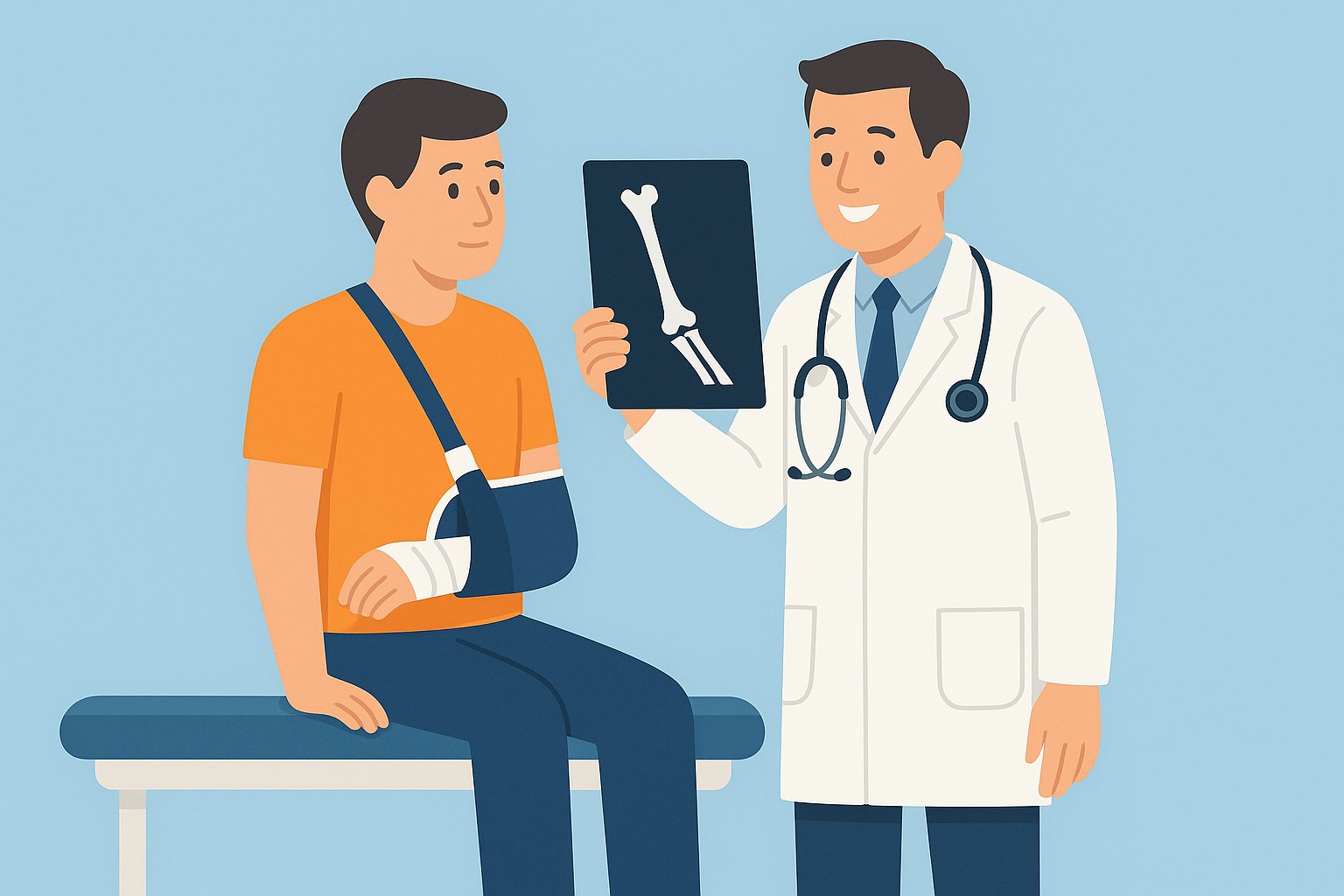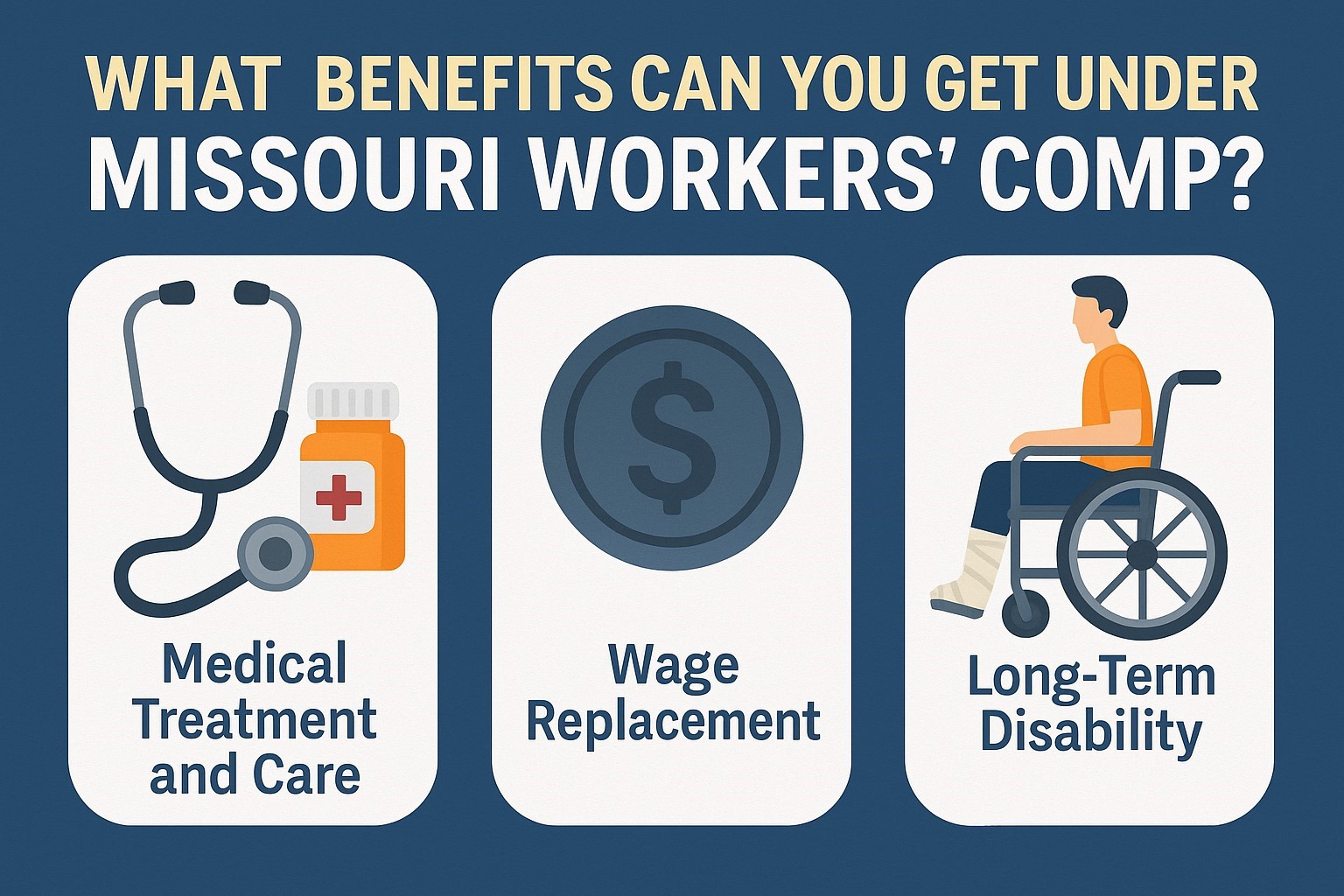If you’ve been injured on the job in Missouri, you may be wondering what benefits are available to you and how to get them. This overview explains the main types of workers’ compensation benefits so you can make informed decisions about your claim.
If you have more specific questions or need personalized guidance, McDuffey & Medcalf LLC is here to help with a free consultation.
1. Medical Treatment and Care
Under Missouri workers’ compensation, your employer (through their insurance) must provide all necessary medical treatment to help you recover from your work-related injury. This typically includes:
- Doctor visits and hospital stays
- Surgery, if needed
- Medication and medical supplies
- Physical or occupational therapy
- Diagnostic tests (X-rays, MRIs, etc.)

Important Note: In most cases, the employer/insurer has the right to choose which doctor or medical provider you see. However, if they refuse or fail to provide necessary treatment after being notified, you may be able to choose your own doctor and still have those costs covered.
Future Medical Care
If you can show there is a “reasonable probability” that further treatment will be needed for your work-related injury, you may qualify for future medical care under workers’ compensation as well.
If you’re wondering how the chart assigns a starting value (in weeks) to each body part, this article explains the numbers on the diagram.
2. Wage Replacement (Temporary Disability Benefits)
Missouri workers’ compensation law provides for two types of temporary disability benefits: Temporary Total Disability (TTD) and Temporary Partial Disability (TPD). These benefits are designed to compensate employees for lost wages during their recovery period following a work-related injury.
Temporary Total Disability (TTD)
Temporary Total Disability (TTD) benefits are payable when an employee is completely unable to work due to their injury. The weekly compensation rate is set at 66 2/3% of the employee’s average weekly earnings at the time of the injury, subject to a maximum limit of 105% of the state average weekly wage. TTD benefits are paid until the employee reaches maximum medical improvement (MMI), returns to work, or their condition stabilizes to the point where further progress is not expected. However, TTD benefits are not payable if the employee is terminated for post-injury misconduct or voluntarily leaves employment when suitable work is available within their medical restrictions
Temporary Partial Disability (TPD):
Temporary Partial Disability (TPD) benefits apply when an employee can return to work in a limited capacity but earns less than their pre-injury wages. TPD benefits are calculated as 66 2/3% of the difference between the employee’s pre-injury average weekly earnings and the amount they are able to earn during the disability period. These benefits are capped at 100 weeks and are also subject to the 105% state average weekly wage limit. Similar to TTD, TPD benefits are not payable if the employee is terminated for post-injury misconduct or voluntarily separates from employment under certain conditions

Missouri law imposes a waiting period for temporary disability benefits. No compensation is payable for the first three days of disability unless the disability lasts longer than 14 days, in which case payment for the initial three days is made retroactively
Eligibility for these benefits requires that the employee’s inability to work or reduced earning capacity is directly related to the work injury. Refusal to participate in vocational rehabilitation or assessments may result in a 50% reduction in benefits for each week of noncompliance
Additionally, employees receiving unemployment compensation are disqualified from receiving TTD benefits during the same period.
Need help figuring out what each week of compensation is worth? This article breaks down how to calculate your Permanent Partial Disability weekly rate step-by-step.
3. Long-Term Disability (Permanent Disability Benefits)
Once your doctor determines you have reached maximum medical improvement, an evaluation is made to see if your injury has left you with any permanent disability. Under Missouri workers’ compensation law, permanent disability benefits are categorized into Permanent Partial Disability (PPD) and Permanent Total Disability (PTD). These benefits are calculated and awarded based on specific statutory provisions.
Permanent Partial Disability (PPD)
PPD is defined as a disability that is permanent in nature and partial in degree. Compensation for PPD is calculated based on the percentage of disability to a specific body part or the body as a whole, as determined by medical findings and approved by the Commission. The weekly compensation rate is 66 2/3% of the employee’s average weekly earnings at the time of the injury, subject to a maximum limit of 55% of the Missouri average weekly wage.
The duration of payments is determined by the “Schedule of Losses” outlined in § 287.190, which assigns a specific number of weeks of compensation for the total loss of use of various body parts. For example, total occupational deafness of one ear is compensated for 49 weeks, while total deafness of both ears is compensated for 180 weeks. The Commission has discretion in determining the percentage of disability and the corresponding compensation

Permanent Total Disability (PTD)
PTD is defined as the inability to return to any employment in the open labor market due to the injury. Compensation for PTD is paid for the lifetime of the employee, starting from the date of maximum medical improvement. The weekly compensation rate is 66 2/3% of the employee’s average weekly earnings at the time of the injury, capped at 105% of the Missouri average weekly wage. PTD benefits terminate upon the death of the employee and do not pass to dependents or the estate.
If the injury occurred after January 1, 2014, additional conditions apply for claims against the Second Injury Fund, requiring a medically documented preexisting disability of at least 50 weeks of PPD that meets specific statutory criteria and a subsequent compensable work-related injury that, when combined, results in PTD
In both PPD and PTD cases, the average weekly wage is adjusted for employees under 21 years of age or those in apprenticeships to account for expected future earnings. Lump-sum settlements may also be agreed upon, prorated over the injured worker’s life expectancy, with the compensation rate set forth in the settlement documents
4. Disfigurement Benefits
To receive disfigurement benefits under Missouri workers’ compensation law, you must have suffered a serious and permanent injury that visibly affects your head, neck, hands, or arms. The injury must be the type that would handicap you when seeking employment. Common examples include visible scars on your face or hands, burns, loss of a front tooth, and other permanent changes to normally visible parts of your body. The key requirement is that the disfigurement must either make it harder for you to find work or involve a permanent alteration to a part of your body that is normally exposed to others.
Benefit Amount and Calculation
Missouri law caps disfigurement benefits at a maximum of 40 weeks of compensation. The actual amount you receive is calculated based on your weekly compensation rate at the time of your injury. The Missouri Division of Workers’ Compensation determines the specific amount by considering how severe your disfigurement is and how it might impact your ability to obtain employment. In some cases, such as dental injuries, the calculation may also consider the specific costs associated with addressing the disfigurement, like the reasonable cost of artificial teeth for a lost front tooth.
Disfigurement Benefits Are Separate from Other Workers’ Compensation Benefits
Disfigurement benefits are separate from other workers’ compensation benefits, meaning you can receive them in addition to medical care, disability payments, and other compensation. The law allows photographs to be used when assessing the extent of disfigurement, provided both you and your employer agree to this method. Special provisions exist for dental injuries under Missouri regulations, which specifically recognize that losing a front tooth qualifies for disfigurement benefits.
Purpose of Disfigurement Benefits
The underlying purpose of disfigurement benefits is to compensate workers who suffer injuries that could handicap them in the job market due to visible changes in their appearance. These benefits acknowledge that some workplace injuries affect your ability to find employment even after you’ve physically recovered, providing financial compensation to help offset this disadvantage when competing for jobs.
5. Vocational Rehabilitation and Therapy
Under Missouri workers’ compensation law, vocational rehabilitation and therapy benefits are available to injured employees to help restore them to suitable, gainful employment. These services must be authorized by the employer and insurer and are provided when the injury is severe enough to result in a loss of suitable employment.
The employer is required to determine within 120 days of the injury whether the employee has sustained such a loss. If so, the employer may retain a rehabilitation practitioner or provider to conduct an initial consultation and develop a vocational rehabilitation plan, which may include vocational testing and retraining.
The initial plan is limited to 26 weeks, with a possible extension of an additional 26 weeks, subject to the employer’s approval. The costs for vocational rehabilitation services, excluding medical treatment and evaluations, are capped at $5,000 unless approved by the Missouri Division of Workers’ Compensation.
Temporary total disability (TTD) or temporary partial disability (TPD) benefits are paid throughout the rehabilitation process until the employee reaches maximum medical improvement, unless terminated by the employee’s return to work or other conditions specified in the law. Additionally, the permanency of the employee’s disability cannot be adjudicated while the employee is participating in rehabilitation services. If an employee refuses to accept rehabilitation services or submit to a vocational rehabilitation assessment deemed necessary by the employer, their disability payments, including TPD benefits, may be reduced by 50% for each week of refusal
If rehabilitation services require the employee to reside away from their customary residence, the employer or insurer must cover reasonable and necessary costs for board, lodging, and travel. Rehabilitation services must be performed by practitioners and providers approved by the Missouri Division of Workers’ Compensation
6. Death Benefits (for Surviving Dependents)
Under Missouri workers’ compensation law, surviving dependents of a deceased employee are entitled to death benefits, which include weekly compensation and funeral expense coverage.
The weekly compensation is calculated as two-thirds (66 2/3%) of the deceased employee’s average weekly earnings at the time of the injury, subject to a maximum limit of 105% of the state average weekly wage. However, the weekly compensation cannot be less than $40 per week.
Additionally, if the surviving spouse remarries, they are entitled to a lump sum payment equal to two years of benefits, after which periodic benefits cease unless there are other dependents eligible for benefits
For funeral expenses, the employer is required to pay the reasonable costs of burial, not exceeding $5,000. Dependents eligible for death benefits include a spouse living with the deceased or legally entitled to support, and children under 18 years of age, or older if they are physically or mentally incapacitated from earning wages.
In cases involving occupational diseases due to toxic exposure, specific provisions apply. For example, for mesothelioma, employers who accept liability must pay an additional amount equal to 300% of the state’s average weekly wage for 212 weeks.
Getting the Most Out of Your Missouri Workers’ Compensation Claim
To maximize workers’ compensation benefits in Missouri, employees should adhere to several best practices, including proper notification to employers, maintaining accurate records, and understanding benefit calculations.
First, employees must promptly notify their employer of any injury or illness. Missouri law requires employees to report injuries immediately, and no later than 30 days after the injury or the date they become aware of its work-related nature. Failure to provide timely notice may jeopardize the employee’s right to receive compensation and other benefits. The notice should include details such as the time, place, and nature of the injury, as well as the name and address of the injured employee. Employers are also required to post notices informing employees of these requirements
Second, maintaining accurate and thorough records is essential. Employees should document all medical treatments, lost work time, and any other relevant details related to the injury. Employers and insurers are required to report injuries and maintain accurate data on work-related injuries, which can be used in compensation proceedings. Employees should ensure that their records align with the information reported by their employer or insurer
By following these practices, employees can better protect their rights and maximize their workers’ compensation benefits under Missouri law.
If You’ve Been Hurt at Work in Missouri, Contact McDuffey & Medcalf LLC
Missouri workers’ compensation claims can be complicated, especially when you’re trying to recover from an injury at the same time.
If you have questions about:
- Whether your injuries qualify for a certain type of benefit,
- How much you should receive in weekly TTD or PPD,
- The possibility of future medical care,
- Or anything else related to a work-related injury,
reach out to the team at McDuffey & Medcalf LLC. Our initial consultations are free, and we’ll let you know if we think our Missouri workers’ compensation attorneys can help you maximize your benefits.








